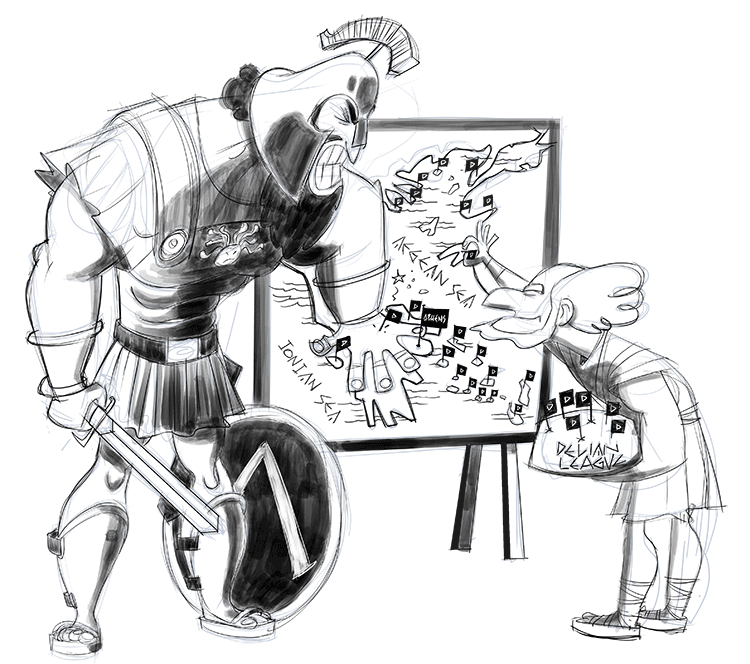Classical Athens (c. 500-c. 200 BC) has typically been thought of as a land of peace and equality. A place where learning and culture thrived, and where logic and reason dominated.
The word empire doesn’t often come up.
This is because empires are built on greed, ambition, desire, and an unquenchable thirst for power. Things we don’t often associate with Athens, the model city of the ancient world.
But the Athenians were not immune to the human condition, and for a brief moment, they sought to extend their power beyond their city walls. Yet while short-lived, the rise and fall of the Athenian Empire had a profound impact on the overall course of Greek history.
The Rise of Athens: The Delian League
Athens didn’t necessarily choose to form an empire. It kind of just happened. And the catalyst was fear.
In around 490 BC, the Persians – a powerful civilization based in modern-day Iran – decided to invade Greece. They were mad because the ethnic Greeks living in Ionia (the southwestern coast of modern-day Turkey) had rebelled. The Athenians, feeling some sympathy for their countrymen, decided to help out.
Well, the rebellion failed. And this really made the Persians angry. Wanting revenge, they amassed a huge army and started marching towards Greece.
Recognizing the danger, Athens called on the rest of the Greek world to help them defend against what seemed to be certain death. Doing this required asking the Spartans for help, which is kind of like asking the Red Sox and Yankees to play on the same team. But Sparta agreed, choosing survival over rivalry.
This all-Greek dream team defeated the Persians at the decisive Battle of Marathon, but the war was far from over. Ten years later, the Persians came back, this time with an even bigger army. But once again the Greeks resisted conquest.
At this point, Sparta, which had the strongest army in Greece and had the biggest impact in the war, was done. They were like, “We did what we needed to do, now we’re going home.”
But Athens was like, “But wait…last time we beat the Persians, they came back ten years later. Shouldn’t we follow them and fight some more, to make sure that it doesn’t happen again?”
Sparta wasn’t convinced this was necessary, but a lot of other Greek city-states were. Those in favor of continuing to fight met on the island of Delos, and in honor of this, they named their new team “The Delian League.”

The Delian League Becomes the Athenian Empire
Athens was the de facto leader of The Delian League. They met in Delos and chose this name as a way of trying to make it look like the group was a democracy. But it really wasn’t, and almost right after it was formed, Athens started trying to boss the other city-states around.
“Go fight here!”
“Defend this island”
“Follow the Persians there!”
Some of the more powerful city-states in the League, such as Naxos and Thasos, didn’t really like this, so they rebelled against Athens. But Athens responded with force, tightening their grip on power.
Shortly thereafter, in 454 BC, Pericles, the leader of Athens, moved the League’s treasury from Delos to Athens. This made the unofficial official -the Delian League had become the Athenian Empire.
Nothing says “we’re in charge” quite like taking all the money…
Now in full control of the Delian League and its resources, Athens began to do as it pleased. This meant fighting in Egypt, Greece, Persia, and in and around Roman territory, mainly the island of Sicily. .
At times they claimed to be fighting the Persians (the original purpose of the Delian League). But more often than not they were just trying to conquer land, or set up colonies that would be loyal to Athens.

Sparta Says “No!”
Throughout most of Greek history, Sparta tried to keep to itself. They weren’t interested in conquest, and were plenty happy to dominate the Peloponnesian peninsula. But war with Persia changed this, and as Athens became more and more assertive and imperial, the Spartans became more and more worried.
Eventually, it became clear that Athens was drunk with ambition. Fearing their own autonomy, the Spartans had no choice but to put its powerful army to work.
Fighting first broke out in 460 BC, before the Delian League had officially been dissolved, in a conflict known as the First Peloponnesian War.
This ended in 446 BC when both sides signed a peace treaty known as The Thirty Years Peace. Athens was subdued, right?
Not so fast…
The Fall of the Athenian Empire
Pretty much right after it signed the Thirty Years Peace, Athens returned to its old tricks – sending out ships and troops to set up colonies and conquer new lands.
Sparta looked the other way for 13 years but eventually couldn’t play dumb any longer. This led to the Second Peloponnesian War.
This rematch lasted 26 years and was a stalemate for most of the time. It’s also most commonly referred to as just “The Peloponnesian War” since it was the longer and more significant of the two conflicts fought between Athens and Sparta.
Eventually, Athens got a bit too greedy and tried to defeat Sparta in Sicily, an island off the coast of Italy that had long been at least partly settled by Greeks.
But this plan failed miserably, and shortly thereafter, the Spartans took advantage of the Athenians’ weakness to cut them off from their food supplies, which forced their surrender.
As punishment, the Spartans abolished Athens’ democracy and installed the “Thirty Tyrants,” a group of pro-Spartan Athenians who would rule with an iron fist and keep Athens from getting too greedy.
Interestingly, the Spartans chose not to sack Athens. This would have been an acceptable form of revenge in ancient times, but the Spartans recognized how important Athens was to Greek culture, so they chose mercy instead.
The Thirty Tyrants didn’t last very long; the Athenians rebelled and threw them out. But they had their intended effect – Athens gave up all its imperial ambitions.
The Decline of Classical Greece
Athens was never really the same after it lost the Peloponnesian War, and neither was Sparta, really.
Riding high of its victory, Sparta went through a brief period of imperialism itself before being defeated by Thebes and the Boeotian League, who were then defeated by Alexander the Great, which launched a whole new era of Greek history.
In this sense, Athens’ brief imperialist era helped usher in the final chapters of Classical Greece, a true golden age of ancient history.
Written by Matthew Jones
Illustrated by Pablo Velarde Diaz-Pache
